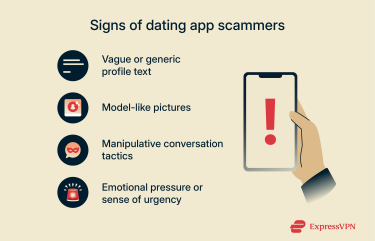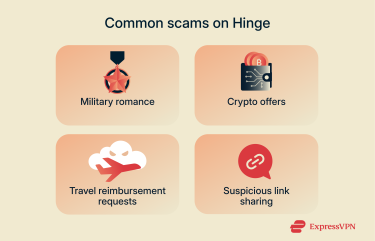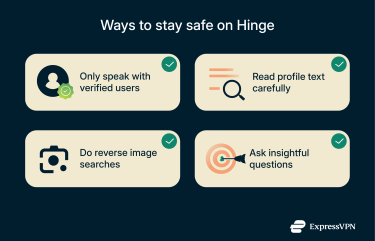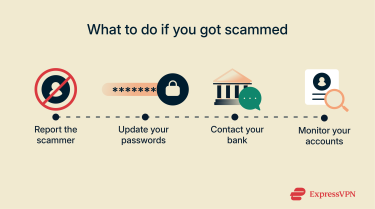Hinge scams: Protect yourself from fake profiles

Not every match on Hinge is genuine. Cybercriminals create fake profiles on the platform to exploit trust and emotion. Such scams can have a significant impact on finances and overall wellbeing.
This guide explains how to identify potential scammers, protect your privacy, and stay safe while using Hinge.
Recognizing scam behavior on Hinge
 If you know how to spot scammers on Hinge, you’ll have a much easier time evading them.
If you know how to spot scammers on Hinge, you’ll have a much easier time evading them.
How scammers exploit profile prompts and photos
- Manipulation of prompts: On Hinge, users respond to prompts that act as conversation starters with potential matches. These are designed to help people find common ground and get to know each other. However, scammers may lie in their responses or use AI tools to craft answers that sound appealing, making it easier to build trust and manipulate their targets.
- Stolen or AI-generated photos: Like most dating apps, Hinge relies heavily on visuals. Scammers often steal photos from models, influencers, or minor celebrities, or use AI-generated images that look convincingly real, to make their profiles look more appealing. Using a reverse image search to check whether a profile’s photos appear elsewhere may help you identify a potential scammer.
Manipulative conversation tactics
- Love bombing: Scammers may profess love or deep attraction after minimal interaction. They often couple this with an excessive flow of compliments and affection to create a false sense of attachment. This emotional pressure can make users more likely to send money or gifts later on.
- Seeking sympathy: This tactic involves the persistent and sometimes unprompted sharing of deeply personal stories, which are often fabricated. Scammers might claim to be ill, unemployed, or alienated from their families because of personal circumstances. It allows them to build emotional trust and justify later requests for financial help.
- Catfishing: Some scammers create entirely false identities, using stolen photos and details from real people. They present themselves as if they are leading impressive lifestyles, and say what victims want to hear. Once a connection forms, they may manipulate victims into sending money, personal favors, or explicit images that may later be used for extortion or blackmail.
- Moving the conversation off-platform: Scammers often try to move conversations elsewhere as quickly as possible, asking to connect on apps like Telegram, WhatsApp, Snapchat, or Signal. They’ll usually give an excuse as to why they prefer those apps, but in reality, they likely intend to reduce the risk of their Hinge account being reported and banned. Alternate platforms also allow the scammer to stay in contact even if their Hinge profile is banned.
Scams to watch out for on Hinge

Military romance scenarios
Some Hinge scammers pretend to be stationed in the military far away. The supposed distance becomes a convenient reason to skip in-person meetings, and video calls are also often avoided due to “security reasons.” This story helps the scammer appear more credible, as common red flags have an excuse. It can allow them to freely build trust before asking for money or other favors.
Crypto “side hustle” offers
Scammers sometimes pose as successful investors, and may use photos of luxury cars and exotic locations to project a life of wealth and success. They may claim to have made their fortune through cryptocurrency and offer to help their matches make profitable investments of their own. In reality, any money sent usually goes straight into the scammer’s account.
Travel reimbursement requests
In this scam, the fraudster claims to be far from their victim, sometimes in another part of the country or even overseas. After building a connection, they offer to visit in person but ask for money to help cover travel costs, such as flight tickets.
They’ll usually have a convincing backstory to explain why they can’t pay themselves. Once the victim sends the money, the scammer may disappear entirely or keep inventing new excuses to prolong the deception.
Suspicious link sharing after initial match
One way cybercriminals steal data and identities is by tricking users into visiting malicious websites. They might claim a link leads to one of their social media accounts or a page with more photos of them. In reality, it often directs to a malicious website that can install malware on your device or capture your personal information.
How to vet a Hinge match
 Given the range of tactics Hinge scammers can use, it’s important to stay cautious when interacting with new people on the app. At the same time, there’s no need to be overly suspicious or assume everyone has bad intentions. Here are some practical ways to vet your matches.
Given the range of tactics Hinge scammers can use, it’s important to stay cautious when interacting with new people on the app. At the same time, there’s no need to be overly suspicious or assume everyone has bad intentions. Here are some practical ways to vet your matches.
Tactics for checking a profile’s authenticity
- Look for profiles with a “Verified” badge, and be cautious of those marked “New Here.” Scammers frequently create new accounts due to their old ones being banned.
- Review their photos carefully. If any look overly professional, polished, or model-like, they may have been taken from influencer accounts or stock photo sites, or they may be AI-generated. Use a reverse image search to verify them.
- Be cautious of profiles that seem vague or generic, lacking any sort of specific details about the user’s likes, background, or interests.
How to use reverse image search
If you come across a match whose profile seems a little too good to be true, complete with photos that look overly polished or perfect, it’s worth running a reverse image search to check if those same pictures appear elsewhere. This can help you determine whether the person you’re talking to is a scammer using stolen photos.
Several reverse image search tools can help verify profile pictures. For the best experience, use reputable options like Google (click the camera icon to search by image), Bing, or PimEyes. Simply copy and paste the image URL into the search box and see if any results appear. You can also upload the image file if you have it downloaded on your device.
Keep in mind that if your search produces no results, it doesn’t necessarily mean the profile is genuine. Scammers may edit stolen photos or use AI-generated images that look realistic but don’t exist elsewhere online.
On the other hand, even if your search does return results, that doesn’t prove the account is fake. People sometimes use the same photos across multiple social media profiles. However, if you find the same images linked to accounts with different names, or clear evidence that the photos belong to someone else, that’s a strong indication the profile is fraudulent.
Questions that help confirm authenticity
Asking questions about a person’s life, hobbies, and job is a good way to learn about them and confirm their identity. Genuine users are more likely to share specific, detailed insights into their lives, while scammers may give more vague, generic responses, since they’re often lying about their true identities.
If you learn key details about someone’s background, you can sometimes cross-check their claims through other platforms. For example, if they mention a workplace, you may be able to look them up on LinkedIn. You can also see if locations they talk about match the places shown in their photos.
It’s also worth asking more about where they claim to be from to see if they know the area well, or for extra details about any hobbies mentioned on their profile. You can also ask to video chat or request they take a specific photo (like holding a sign with a short message) to help confirm they are real. Be aware that AI tools can be used to attempt to fake these photos so don’t make this your only verification method.
What should you do if you were scammed?
 If you know or suspect you’ve been the victim of a Hinge scam, it’s important to act quickly. The sooner you take action, the better your chances of minimizing the consequences of the scam.
If you know or suspect you’ve been the victim of a Hinge scam, it’s important to act quickly. The sooner you take action, the better your chances of minimizing the consequences of the scam.
Take immediate action to limit further damage
First of all, stop speaking with the scammer and report them to the Hinge moderation team by going to their profile, tapping the three dots button, and then selecting Report (you can also report them directly through the chat in the same way.) This will unmatch the scammer and they will be unable to access the chat between you or view your profile.
 If Hinge’s moderators find evidence of some sort of violation, they’ll decide how serious it is, before issuing an appropriate response. In less severe situations, the reported user may simply receive a warning about their behavior. Meanwhile, those who are found to have committed more serious offenses will be banned from the platform.
If Hinge’s moderators find evidence of some sort of violation, they’ll decide how serious it is, before issuing an appropriate response. In less severe situations, the reported user may simply receive a warning about their behavior. Meanwhile, those who are found to have committed more serious offenses will be banned from the platform.
Next, if you fear that the scammer has stolen any of your credentials, like passwords, you should quickly change them and enable two-factor authentication (2FA) to secure your accounts. A tool like ExpressVPN Keys can help with this by generating strong, unique passwords and storing them safely.
If you sent money to a scammer, reach out to your bank or the payment provider you used. If you act fast enough, they may be able to block or cancel the transaction.
After that, keep a close eye on your accounts, email, and finances to look for any signs of suspicious activity.
Which authorities and platforms to notify
All suspected scammers should be reported directly to Hinge, using the app’s built-in reporting feature. If you spoke with the scammer on any other platforms, you may also be able to report them there.
If you wish to take the matter further, you may also report the scammer to official authorities. In the U.S., this includes the Federal Trade Commission (FTC) and the Internet Crime Complaint Center (IC3).
What you should not do after getting scammed
- Don’t continue communicating with the scammer on Hinge or anywhere else. If they try to contact you, block them.
- Don’t send them anything else, like money or gifts, and don’t share any further personal information.
- Be wary of any other strangers who contact you during this period, as scammers may make additional fake profiles to keep talking to you.
Tools and habits for safer Hinge use
One of the most effective ways to reduce your risk of dating app scams is to take your time getting to know people. Avoid sharing personal information too soon, and focus on learning about the person’s life and background to confirm their identity before taking it further.
The following tips, tools, and techniques should help you enjoy safer online dating experiences on Hinge.
Stick to in-app messaging until trust is built
As mentioned earlier, scammers often try to move conversations to other platforms. While regular users may also want to do this for a variety of reasons, it’s important to not feel pressured to agree to this. Stay within Hinge’s messaging system until you have had time to get to know the person better.
Don’t share personal details
Be cautious about how much personal information you share with new matches. It’s fine to mention your hometown or what you do for work, but avoid giving unnecessary details early on. A scammer can use that information to make their story more relatable in an attempt to build trust faster. Here are a few types of information you should be especially careful about sharing:
- Your full name: If someone learns your full name, they can often use search engines to find personal information about you, such as your home address, workplace, or even your friends and family. It’s safer to stick to first names or nicknames when chatting with new matches.
- Financial information: Never share financial details like card numbers, account numbers, or banking information with people you have not met in person. Even if someone offers to send you money, providing this information is a major red flag and could lead to financial theft or fraud.
- Security question answers: Scammers may ask harmless-sounding questions about your pets, the street you grew up on, or your school. While these can seem like genuine attempts to get to know you, they might actually be trying to gather answers to common security questions. Be cautious if these topics come up unexpectedly or if someone presses for very specific personal details.
- Your phone number or email: Sharing your phone number or email can give scammers more ways to find information about you online.
Hinge’s verification system explained
Hinge offers an optional verification feature that allows users to prove their identities. This involves the user recording a short video selfie and submitting it to the Hinge servers via the app. Hinge then uses a combination of technologies, including facial recognition, to confirm that the user is a real person and that the person in the video matches the one in the pictures.
If a user passes these checks, they get a special “Verified” badge added to their profiles that all other users will be able to see. Scammers may be unable to easily pass this verification process, so by only interacting with verified profiles, you can lower your risk of running into one.
However, this system is not foolproof. There may be ways for scammers to gain access to verified accounts and use them to scam the unsuspecting. They could, for example, hack into a real user’s account and then impersonate that person, or possibly use AI to generate realistic video selfies that can be used to pass the verification process.
FAQ: Common questions about Hinge scams
How can you spot a scammer on Hinge?
Some common signs of Hinge scammers include profiles that are either brand new and have the “New Here” badge or those that seem almost too good to be true. Scammers may also be overly affectionate in conversation even if they haven’t known you for long, and may repeatedly request to talk on other platforms and/or ask you for money while refusing to meet up or video call.
How can you stay safe while using Hinge?
Some smart ways to stay safe on Hinge include never giving any personal or sensitive information, especially to someone you haven’t met in person. Reject any requests to send money or use other platforms and messaging services. It’s also wise to carefully check the profile of the person you’re speaking with to look for any red flags.
Does Hinge take action against fake users and scammers?
Yes, Hinge has strict community guidelines it expects users to follow and will take action against users who violate those rules. You can report suspected scam accounts to the Hinge moderation team.
How do you report a scammer on Hinge?
Simply go to the user’s profile, tap the three dots icon, then tap the Report button. You can then select a reason why you’re filing a report. Hinge’s moderation team will take over from there.
Can you get banned for using a fake profile on Hinge?
Yes, Hinge’s terms specifically state that users should not misrepresent their age or identity. You can get banned if you break this rule by using fake or stolen pictures or false profile information.
Take the first step to protect yourself online. Try ExpressVPN risk-free.
Get ExpressVPN





















